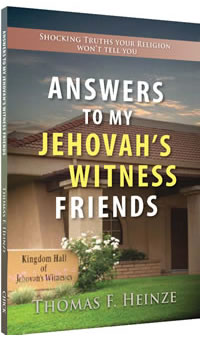Failed Prophecies Cast Doubt on All Watchtower Interpretations of Scripture
- Issue Date: March/April 2000
Thomas Heinze, in his book, Answers to My Jehovah's Witness Friends, says that Jehovah's Witnesses are vulnerable in two areas. The first is false prophecy and the other is mistaken interpretations of the Bible.
Their false prophecies are easily checked because they have predicted specific dates for future events such as the beginning of the millennium and the second coming of Christ. The dates have come and gone without the events occurring causing them some embarrassing retractions and "creative" explanations.
Beginning from one small Bible study in Pennsylvania in 1870, by 1989 the Witnesses had grown to more than 57,000 congregations worldwide. Most of their doctrines were set by the early 1900s, when their early prophecies began to fail.
Founder Charles Taze Russell made several early predictions and pronouncements such as the start of the millennium in 1872, that Jesus actually came in 1874, and that 1914 would see, "The end of a war that would destroy the kingdoms of this world and fully establish the Kingdom of God."
When it became obvious that the prophecies had failed, the dates were revised only to have them fail again. Heinze elaborates on the many failed predictions including the building of a mansion in 1929 in San Diego, California for "faithful men of old" who were soon to be resurrected to take charge of the earth.
The house eventually became an embarrassing monument to their failed prophecy so it was sold in 1948.
Heinze points out that, since these failed prophecies were based on erroneous interpretations of Bible, how can one trust the Watchtower to rightly divide the Scriptures when it comes to their doctrine?
The rest of the book deals with these doctrines, comparing in detail the Watchtower teachings and the Bible. He shows that the Jehovah's Witness Jesus is not the Jesus of the Bible; that the Holy Spirit is a person, not a "force" as they claim; and that all the saved go to heaven, not just 144,000.
He also shows how they twist the scriptures in their refusal to accept blood transfusions.
But throughout the book, Heinze repeatedly challenges the reader to consider the errors and inconsistencies of the Watchtower teaching.
Thus the book serves a dual purpose. On the one hand it equips the soul winner with devastating information to use in witnessing to the Witnesses. On the other hand, if a Jehovah's Witness should dare to go against his JW indoctrination and read the book, it gently coaxes him to consider the errors of the Watchtower.
- See more articles on related topics:
- False Religions
- Jehovahs Witness
- Cults
- Watchtower
- Failed Prophecy
Other Articles from March/April 2000:
- Booklet Defining KJV English Words Fits in Back of Your Bible
- Pope Declares Jubilee Year - Brings Back Indulgences
- Chick Mail Bag Mar-2000
- Media Ignores Brutal Murder by Homosexuals
- NIV Subtly Diminishes Character and Ministry of Jesus
- Prison Ministry Letters: March-2000
- Schools Pressured to Tell Students Sodomy is OK
- Tract Passing Tips- March 2000
- Some Public Schools Becoming War Zones
- Get the Word of God Out While You Can!
More on Jehovahs Witness:
Products of Interest:
-

Answers To My Jehovah's Witness Friends
128 pages
Don’t turn JW’s away from your door. Learn how to reach them. This book exposes the errors of this religion and provides questions JW’s can’t answer. Covers the name "Jehovah," giving and receiving blood, eternal punishment and more. -

Watchtower's Coming Crisis, The
64 pages
Who will guide the Watchtower when the original witnesses all die? This is a crisis that will shake the faith of millions of JWs. Here are the facts. -

Winning The Witnesses
107 pages
Help JWs see the Watchtower is NOT inspired, but the Bible IS! So which should they trust? Construction of a Kingdom Hall was stopped with this approach. 
Visitors, The
Two Mormon missionaries learn the truth about their church.



